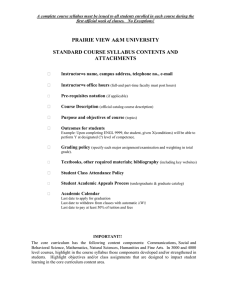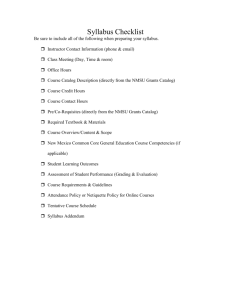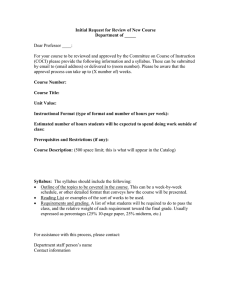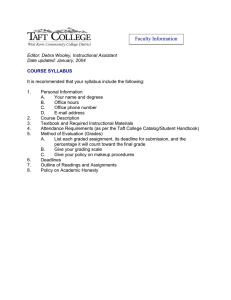COURSE SYLLABUS (Essential Elements)
advertisement
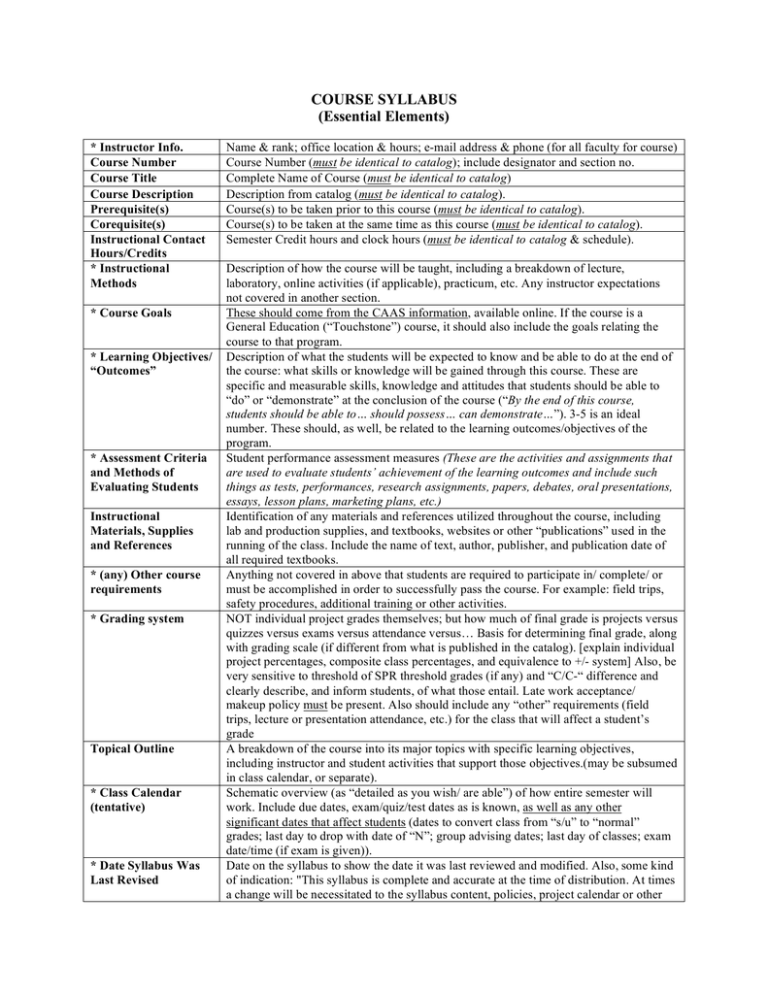
COURSE SYLLABUS (Essential Elements) * Instructor Info. Course Number Course Title Course Description Prerequisite(s) Corequisite(s) Instructional Contact Hours/Credits * Instructional Methods * Course Goals * Learning Objectives/ “Outcomes” * Assessment Criteria and Methods of Evaluating Students Instructional Materials, Supplies and References * (any) Other course requirements * Grading system Topical Outline * Class Calendar (tentative) * Date Syllabus Was Last Revised Name & rank; office location & hours; e-mail address & phone (for all faculty for course) Course Number (must be identical to catalog); include designator and section no. Complete Name of Course (must be identical to catalog) Description from catalog (must be identical to catalog). Course(s) to be taken prior to this course (must be identical to catalog). Course(s) to be taken at the same time as this course (must be identical to catalog). Semester Credit hours and clock hours (must be identical to catalog & schedule). Description of how the course will be taught, including a breakdown of lecture, laboratory, online activities (if applicable), practicum, etc. Any instructor expectations not covered in another section. These should come from the CAAS information, available online. If the course is a General Education (“Touchstone”) course, it should also include the goals relating the course to that program. Description of what the students will be expected to know and be able to do at the end of the course: what skills or knowledge will be gained through this course. These are specific and measurable skills, knowledge and attitudes that students should be able to “do” or “demonstrate” at the conclusion of the course (“By the end of this course, students should be able to… should possess… can demonstrate…”). 3-5 is an ideal number. These should, as well, be related to the learning outcomes/objectives of the program. Student performance assessment measures (These are the activities and assignments that are used to evaluate students’ achievement of the learning outcomes and include such things as tests, performances, research assignments, papers, debates, oral presentations, essays, lesson plans, marketing plans, etc.) Identification of any materials and references utilized throughout the course, including lab and production supplies, and textbooks, websites or other “publications” used in the running of the class. Include the name of text, author, publisher, and publication date of all required textbooks. Anything not covered in above that students are required to participate in/ complete/ or must be accomplished in order to successfully pass the course. For example: field trips, safety procedures, additional training or other activities. NOT individual project grades themselves; but how much of final grade is projects versus quizzes versus exams versus attendance versus… Basis for determining final grade, along with grading scale (if different from what is published in the catalog). [explain individual project percentages, composite class percentages, and equivalence to +/- system] Also, be very sensitive to threshold of SPR threshold grades (if any) and “C/C-“ difference and clearly describe, and inform students, of what those entail. Late work acceptance/ makeup policy must be present. Also should include any “other” requirements (field trips, lecture or presentation attendance, etc.) for the class that will affect a student’s grade A breakdown of the course into its major topics with specific learning objectives, including instructor and student activities that support those objectives.(may be subsumed in class calendar, or separate). Schematic overview (as “detailed as you wish/ are able”) of how entire semester will work. Include due dates, exam/quiz/test dates as is known, as well as any other significant dates that affect students (dates to convert class from “s/u” to “normal” grades; last day to drop with date of “N”; group advising dates; last day of classes; exam date/time (if exam is given)). Date on the syllabus to show the date it was last reviewed and modified. Also, some kind of indication: "This syllabus is complete and accurate at the time of distribution. At times a change will be necessitated to the syllabus content, policies, project calendar or other information. When this happens the class will be notified both in class and via e-mail of the change to the syllabus, and presented with corrected information as it becomes available." Disability Statement (must include italics “sic”) * Student Code of Conduct (must include italics “sic”) The faculty and staff of Winthrop University are committed to providing educational opportunities for all students. The Coordinator of Services for Students with Disabilities serves as a liaison between students with disabilities and the Winthrop community to ensure full access to programs and services. To qualify for services, the student must provide current, appropriate documentation of a disability from a qualified health services provider. To avail yourself of this service please contact Services for Students with Disabilities at 323-2233 or visit their offices at 203 Crawford Building. Students are responsible for identifying themselves to the Coordinator of Services for Students with Disabilities. Services are provided on a semester-by-semester basis, and students must contact the Coordinator before the beginning of each semester. As noted in the Student Conduct Code: “Responsibility for good conduct rests with students as adult individuals.” The policy on student academic misconduct is outlined in the “Student Conduct Code Academic Misconduct Policy” in the online Student Handbook (http://www2.winthrop.edu/studentaffairs/handbook/StudentHandbook.pdf). (More explicit policies relative to a specific discipline/college also may be posted in a syllabus.) Be sure your syllabus also: • Clearly describes attendance policies, penalties • Class cancellation policy (Dept. office must be notified of ALL cancellations) • Cell phone policy (and policies of leaving class to work, etc.) • “Official Communications” policies – the Winthrop e-mail system is an “official” medium of university communications; all students must have and maintain a “Winthrop.edu” account. Students will be held responsible for any information distributed via that e-mail account. Student should join listservs for classes. • Relationship of this class to any reviews (SPR), or other “thresholds” in the degree program • Relationship of performance and grade of this class to applicability toward degree

